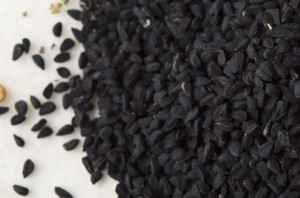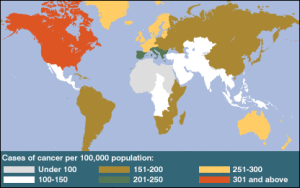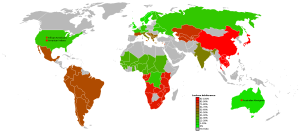Contents
Did you know that there is an affordable super-food that has miraculous medicinal properties? It is the one thing that big-pharmaceuticals would be glad to see the back of. From hair loss to treating cancer, this magic pill helps cures all. It is not a product from the book of a medieval alchemist. It is not as hidden as occultist knowledge. What is it? It is simply the Black seed.
If there was such a thing as panacea, it probably would have contained black seed.

What is Black seed?
Black seed (Nigella Sativa) is known by many names. Roman coriander, Black onion seeds, Kalonji and Nigella seeds are the most popular ones. They are used in African and west Asian cuisine and have a bitter, peppery and slightly nutty flavour.
It comes from the flower of an annual herbaceous plant Nigella Satvia, which is a natural species. This plant is commonly found in north east Africa and west Asia. It is harvested mainly in Egypt, India, Pakistan, Bangladesh and Turkey. Earliest records indicate the plant’s presence on the fertile banks of river Nile. The seed occupies almost a mystical status because of its miraculous healing power.
Historical Significance
For centuries, Black seed has been used by Muslims as a remedy for almost all ailments. It is considered the best medicine against any medically adversarial condition known to man.
In traditional Arab systems of medicine ( Tib and Hikmat ) it has been used for over a millennia. The custom stems from the practice of prophet Mohammad (PBUH), who has been recorded saying that within these seeds is the cure for every disease but death (ref: Sahih Bukhari Vol. 7. Book 71, Hadith 582). The mention of the blessed seed (as it is called in the middle-east) can also be found in the Old Testament (Isaiah 28: 25, 27).
The use of black seed even predates the Judaic era. A jar of black seed was found in the tomb of king Tutankhamun who ruled ca. 1332–1323 BC.
Medicinal Benefits of Black Seed
As mentioned earlier, the black seed helps to avert any adversarial condition known to man. It is anti-inflammatory, anti-biotic, anti-bacterial, anti-allergy, anti-bronchial and anti-carcinogenic [1-5]. It provides a significant boost to the immune system.
With over 600 research articles published in leading medical journals, the benefits of black seeds have been well documented . Most of these research articles can be accessed from the link mentioned below [8].
More recent studies have looked into the anti-epileptic effect is has on children with refractory seizure [6].
Before the practice modern medicine took over, black seeds were used extensively in west Asian and Arab countries. It’s use saw a slight decline with the rise in allopathic treatment but in recent past but is witnessing a strong resurgence. This is due to growing awareness in the west after conclusive scientific studies.
The future of Black seed
We are living in a world where people are growing sceptical of the giant pharmaceuticals companies. Due to lack of transparency, concerns are being raised for an emerging oligopoly in the health sector, in which profiteering comes before human suffering. There is a developing sense that free market economy in the world of medicine is bringing forth the drugs that yield higher profits rather than those that are more medically beneficial.
In light of this developing scenario, alternate therapies are gaining popularity. The word of mouth on the internet is catching up fast with the impact of adverts on main stream media. Type the words black seed on the internet and you find numerous sellers websites, videos and testimonials. Black seed and its oil can be purchased in most Asian stores.
Today, research is being carried out across several universities on how to best extract the compounds in the seed. In 2010, Nestlé filed a patent application for use of extracted Thymoquinone from N. Sativa as a food allergy treatment.
World Map for Cancer and Food Allergy Incidence
The world map for cancer rates and lactose intolerance are shown bel
ow [8].

It can be seen that both the rates of cancer and food allergies are uncommon in countries where Nigella Sativa is part of the cuisine.

While it may be premature to suggest that there might be a direct link between the use of black seed and low cancer rates, but this avenue can be further explored.
Black Seed Vs Black Seed Oil
Historically, for medicinal use black seeds have been consumed as raw whole grain that is sometimes slightly toasted. Because of its potency, it is used in small amounts and not more than 1 -3 grams is used at a time.
If oil is used instead of whole seeds than not more than half a tea spoon should be consumed at a time. It is preferred to dilute the oil in glass of water to reduce the bitter taste. People, who use it for weight loss, consume the oil-water mixture first thing in the morning.
There has been some debate on the benefit of using oil instead of raw seeds. Traditionally oil hasn’t been used to an extent it is being used today. It should be noted that there are a variety of oil extraction processes (Supercritical fluid extraction, hydro distillation, cold pressing etc). Each method produces oil of different composition.
Based on the nature of the process, some of them may leave behind important compounds present in the seeds. Application of heat and pressure can also alter the chemistry of constituents inside the seed. For this reason, oil drawn from cold pressing is more popular among customers. The cold pressing method, while in-efficient does not involve the use of heat or chemicals.
Black seed oil contains conjugated linoleic (18:2) acid, Thymoquinone, Nigellone (Dithymoquinone), Melanthin, Nigilline, Damascenine, and Trans-Anethole.
Black Seed Recipes
Black seeds are widely used in Asian and north African cuisine. It is one of the five spices, along with fenugreek, fennel, mustard, cumin seeds that make up the spice blend “Pach phoran” that is commonly available in Asian stores.
Black seed can be used in a variety of ways. Gently toast and toss them in your salad or sizzle it in your BBQ or bake it in your bread. It also pair well with savoury pastries and sweet roasted vegetables. It adds aroma and rich flavour when sprinkled lightly on top of white rice and couscous.
Find below links to popular black seed recipes.
- Moroccan Chicken Tagine with Nigella Seeds (Black Seeds or Sanouj)
- Squash and Nigella Seed soup
- Aloo panchporan (Stir-fried potatoes tempered with five spices)
Some packed Nan breads available in food stores contain black seeds.
So the next time you are searching for a gift for your parents, head to your local Asian food store and by a bottle of black seed oil. Make them feel blessed.
References
- Tiruppur Venkatachallam SK, Pattekhan H, Divakar S and Kadimi US: Chemical composition of Nigella sativa L. seed extracts obtained by supercritical carbon dioxide. J Food Sci Technol 2010, 47:598-605.
- Burits M and Bucar F: Antioxidant activity of Nigella sativa essential oil. Phytother Res 2000, 14:323-8.
- Fararh KM, Shimizu Y, Shiina T, Nikami H, Ghanem MM and Takewaki T: Thymoquinone reduces hepatic glucose production in diabetic hamsters. Res Vet Sci 2005, 79:219-23.
- Edris AE: Anti-cancer properties of Nigella spp. Essential oils and their major constituents, thymoquinone and betaelemene. Curr Clin Pharmacol 2009, 4:43-6.
- Ismail N, Ismail M, Al-Absi A, Al-Naqeeb G: Thymoquinone rich fraction from Nigella sativa and thymoquinone are cytotoxic towards colon and leukemic carcinoma cell lines. J. Med. Plants Res 2011, 5:3359-3366.
- Akhondian, Javad; Kianifar, Hamidreza; Raoofziaee, Mohammad; Moayedpour, Amir; Toosi, Mehran Beiraghi; Khajedaluee, Mohammad (2011). “The effect of thymoquinone on intractable paediatric seizures (pilot study)”. Epilepsy Research 93 (1): 39–43.
- Black Seed Oil Cures many Cancers
- Worldwide Cancer reported by BBC
Disclaimer
The information in this article should not be used as a medical advice.







We ought to use this more often